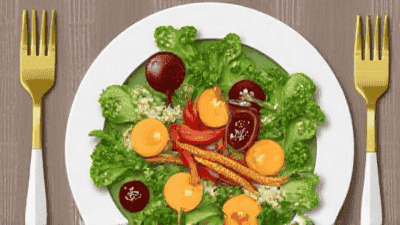One-Week Vegan Meal Plan: Simple and Nutritious
As more people embrace plant-based diets, the interest in vegan alternatives to traditional meat products has surged. A vegan diet can provide all the necessary nutrients for a healthy lifestyle while reducing the impact on the environment and improving animal welfare.

As more people embrace plant-based diets, the interest in vegan alternatives to traditional meat products has surged. A vegan diet can provide all the necessary nutrients for a healthy lifestyle while reducing the impact on the environment and improving animal welfare. However, transitioning can initially seem overwhelming, especially concerning ensuring adequate protein intake and overall nutrition.
Understanding Vegan Protein Sources
Before diving into the meal plan, it’s essential to understand the various plant-based protein sources available that can act as substitutes for meat. Here are some of the primary options:
1. Legumes
Legumes, such as lentils, beans, and chickpeas, are excellent sources of protein and fiber. They provide iron, folate, and other essential nutrients.
2. Tofu and Tempeh
Tofu and tempeh are made from soybeans, offering a complete protein profile. Tofu is versatile and can absorb flavors well, while tempeh has a firmer texture and nuttier flavor.
3. Seitan
Seitan, made from wheat gluten, has a chewy texture that resembles meat, making it a popular meat substitute in many dishes.
4. Nuts and Seeds
Nuts and seeds, such as almonds, chia seeds, and pumpkin seeds, provide healthy fats, protein, and various vitamins and minerals.
5. Whole Grains
Grains like quinoa, brown rice, and barley not only provide protein but also serve as a source of carbohydrates and fiber.
6. Plant-Based Meat Alternatives
With the rise of the vegan movement, various companies produce plant-based meat alternatives like burgers, sausages, and nuggets, designed to mimic traditional meats in taste and texture.
Benefits of a Vegan Diet

Adopting a vegan diet can have numerous benefits, including:
- Nutrient-Rich: A well-planned vegan diet is rich in essential nutrients, such as fiber, vitamins, and minerals.
- Reduced Risk of Chronic Diseases: A plant-based diet has been linked to a lower risk of heart disease, diabetes, and certain cancers.
- Weight Management: Many people find that following a vegan diet helps them manage their weight due to the increased fiber and lower caloric density of plant-based foods.
- Improved Digestive Health: The high fiber content in fruits, vegetables, whole grains, and legumes promotes healthy digestion and regularity.
- Environmental Sustainability: A plant-based diet has a lower carbon footprint compared to diets high in animal products, contributing to environmental conservation.
One Week Vegan Meat Plan
Day 1: Protein-Packed Legumes
Breakfast: Chickpea Scramble
Ingredients: 1 cup chickpeas (canned or cooked), 1 tablespoon olive oil, 1/4 cup diced onion, 1/4 cup bell pepper, turmeric, salt, and pepper.
Instructions:
- In a skillet, heat olive oil and sauté onion and bell pepper until soft.
- Add chickpeas, turmeric, salt, and pepper, cooking for an additional 5 minutes.
Nutrition: Approx. 20g protein, 10g fiber.
Lunch: Lentil Salad
Ingredients: 1 cup cooked lentils, cherry tomatoes, cucumber, parsley, olive oil, lemon juice.
Instructions:
- Mix all ingredients in a bowl, season with olive oil and lemon juice.
Nutrition: Approx. 18g protein, 12g fiber.
Dinner: Black Bean Tacos
Ingredients: Taco shells, 1 can black beans, avocado, salsa, lettuce.
Instructions:
- Heat black beans in a pot, mash slightly.
- Assemble tacos with beans, avocado, salsa, and lettuce.
Nutrition: Approx. 15g protein, 10g fiber.
Day 2: Savory Tofu Dishes
Breakfast: Tofu and Veggie Stir-Fry
Ingredients: 1/2 block firm tofu, mixed vegetables, soy sauce, sesame oil.
Instructions:
- Crumble tofu and cook in a skillet with sesame oil until golden.
- Add vegetables and soy sauce, cooking until tender.
Nutrition: Approx. 25g protein.
Lunch: Tofu Wrap
Ingredients: Whole-grain wrap, 1/2 block tofu, spinach, hummus.
Instructions:
- Spread hummus on a wrap, add cooked tofu and spinach, and roll it up.
Nutrition: Approx. 20g protein.
Dinner: Stir-Fried Tofu with Broccoli and Rice
Ingredients: 1 block tofu, broccoli florets, brown rice, garlic.
Instructions:
- Stir-fry tofu and garlic; add broccoli until tender. Serve over brown rice.
Nutrition: Approx. 28g protein.
Day 3: Wholesome Grains and Seitan
Breakfast: Quinoa Breakfast Bowl
Ingredients: 1 cup cooked quinoa, almond milk, fruits, chia seeds.
Instructions:
- Mix quinoa with almond milk and top with fruits and chia seeds.
Nutrition: Approx. 15g protein.
Lunch: Seitan Stir-Fry
Ingredients: 1 cup sliced seitan, bell peppers, onions, soy sauce.
Instructions:
- Cook seitan and vegetables in soy sauce until heated through.
Nutrition: Approx. 25g protein.
Dinner: Seitan Fajitas
Ingredients: Whole wheat tortillas, seitan, avocado, salsa, bell peppers.
Instructions:
- Cook seitan with bell peppers. Serve in tortillas with avocado and salsa.
Nutrition: Approx. 30g protein.
Day 4: Pulses and Nuts
Breakfast: Peanut Butter Smoothie
Ingredients: 1 banana, 2 tablespoons peanut butter, almond milk, spinach.
Instructions:
- Blend all ingredients until smooth.
Nutrition: Approx. 15g protein.
Lunch: Mixed Bean Salad
Ingredients: 1 cup mixed beans, cherry tomatoes, parsley, olive oil.
Instructions:
- Mix all ingredients in a bowl and chill.
Nutrition: Approx. 20g protein.
Dinner: Chickpea Curry
Ingredients: 1 can chickpeas, coconut milk, curry powder, spinach.
Instructions:
- Cook chickpeas with coconut milk and curry powder. Add spinach until wilted.
Nutrition: Approx. 18g protein.
Day 5: Versatile Tempeh
Breakfast: Tempeh Bacon
Ingredients: 1 block tempeh, soy sauce, maple syrup, smoked paprika.
Instructions:
- Slice tempeh, marinate, and pan-fry until crispy.
Nutrition: Approx. 20g protein.
Lunch: Tempeh Sandwich
Ingredients: Whole grain bread, sliced tempeh, lettuce, tomato, mustard.
Instructions:
- Layer tempeh with lettuce and tomato on bread.
Nutrition: Approx. 22g protein.
Dinner: Tempeh Stir-Fried Rice
Ingredients: Cooked brown rice, tempeh, vegetables, soy sauce.
Instructions:
- Stir-fry tempeh and vegetables, then mix in rice and soy sauce.
Nutrition: Approx. 26g protein.
Day 6: Exploring Plant-Based Meats
Breakfast: Breakfast Burrito with Vegan Sausage
Ingredients: Vegan sausage, whole grain tortilla, beans, avocado.
Instructions:
- Cook vegan sausage and assemble burrito with beans and avocado.
Nutrition: Approx. 25g protein.
Lunch: Vegan Meatball Sub
Ingredients: Vegan meatballs, whole grain sub roll, marinara sauce, spinach.
Instructions:
- Heat meatballs, place into a sub roll with marinara and spinach.
Nutrition: Approx. 28g protein.
Dinner: Vegan Burger with Sweet Potato Fries
Ingredients: Vegan burger patty, lettuce, tomato, whole grain bun, sweet potatoes.
Instructions:
- Cook burger and serve with toppings. Bake sweet potatoes as fries.
Nutrition: Approx. 30g protein.
Day 7: Creative Vegan Cuisine
Breakfast: Vegan Chia Pudding
Ingredients: 1/4 cup chia seeds, 1 cup almond milk, maple syrup, fruits.
Instructions:
- Mix chia seeds and almond milk, refrigerate overnight, then top with fruit.
Nutrition: Approx. 10g protein.
Lunch: Stuffed Bell Peppers
Ingredients: Bell peppers, quinoa, black beans, corn, spices.
Instructions:
- Cook filling, stuff into peppers, and bake until tender.
Nutrition: Approx. 20g protein.
Dinner: Vegan Pasta Primavera
Ingredients: Whole grain pasta, mixed seasonal vegetables, olive oil, garlic.
Instructions:
- Cook pasta and sauté vegetables in olive oil with garlic. Combine.
Nutrition: Approx. 18g protein.
Cooking Tips for a Vegan Meat Plan

Meal Prep: Prepare ingredients like grains, beans, and sauces in advance to save time during the week.
Use Freezing: Cooking in bulk and freezing portions can make meal planning more manageable.
Experiment with Flavors: Use a variety of spices and sauces to keep meals exciting and flavorful.
Read Labels: When using store-bought vegan products, check nutrition labels to ensure they are low in unhealthy additives.
Stay Balanced: Aim for a variety of protein sources throughout the week to receive a spectrum of amino acids.
Nutritional Considerations
While a vegan meat plan can be nutritional, it’s essential to be mindful of some nutrients that may require extra attention:
Vitamin B12: A crucial vitamin for nerve function and the production of red blood cells, vitamin B12 is primarily found in animal products. Vegans can opt for fortified foods or supplements.
Iron: While plants provide non-heme iron, it’s often less bioavailable than the iron from animal sources. Pair iron-rich foods like lentils with vitamin C sources (like bell peppers) to enhance absorption.
Omega-3 Fatty Acids: Omega-3s are vital for brain health and can be found in flaxseeds, walnuts, and chia seeds. Consider adding these to your daily intake.
Calcium: Ensure adequate calcium intake through fortified plant milks, leafy greens, and tofu made with calcium sulfate, which can help maintain bone health.
Protein Variety: Do not rely solely on one source of protein. Include a diverse range of beans, legumes, nuts, and grains in your diet for optimal amino acid intake.
Conclusion

Transitioning to a vegan diet can be enjoyable, fulfilling, and beneficial for your health and the environment. By following this one-week vegan meat plan, you can easily incorporate a variety of nutritious and delicious meals into your routine. These meals provide the essential nutrients your body needs to thrive while allowing you to explore new flavors and ingredients.
Most importantly, listen to your body as you adapt to this new diet. Make adjustments based on your preferences and nutritional needs. With proper planning and a variety of plant-based foods, you can thrive on a vegan diet while enjoying all the benefits that come with it.




